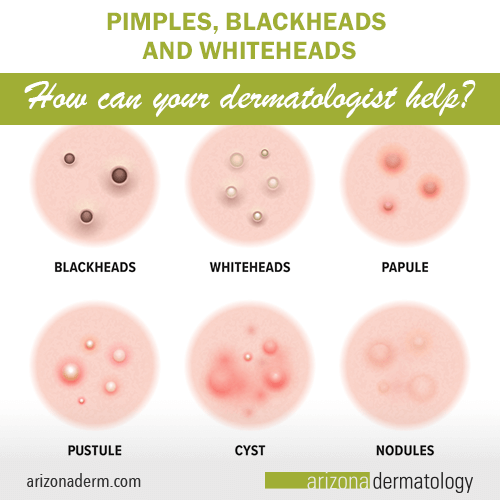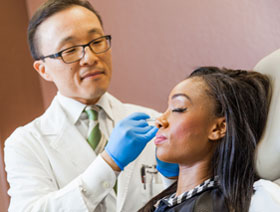 Acne is the most common skin condition treated by dermatologists: between 40 and 50 million people in the U.S. have it. While approximately 85% of teens and young adults will develop acne, the condition is becoming even more common in adulthood with 15% of adult women diagnosed, according to the American Academy of Dermatology.
Acne is the most common skin condition treated by dermatologists: between 40 and 50 million people in the U.S. have it. While approximately 85% of teens and young adults will develop acne, the condition is becoming even more common in adulthood with 15% of adult women diagnosed, according to the American Academy of Dermatology.
But “acne” can be a confusing term because there are different types of blemishes that respond to different types of treatments. Acne can be mild, moderate or severe. It mostly occurs on the face, but is also commonly found on the chest, back, and shoulders. And while it may be considered harmless, dermatologists take the condition seriously because of the potential negative psychological and social effects.
Let’s take a look at the different types of blemishes that constitute acne and what your dermatologist can do to treat them.
Blackheads.
Blackheads are a form of noninflammatory acne that appear as little black bumps, usually on the face and especially on the nose. They form when the hair follicle becomes clogged with dirt and oil, forming a “comedo.” While they are named “blackheads,” these clogged pores can also appear brown, gray or yellowish. The coloring is due to the follicle being open, exposing the material inside to the air.
Whiteheads.
Another form of non-inflammatory acne, whiteheads are clogged pores where the pore has remained closed. As a result, they appear as small white or skin-colored bumps.
Pimples.
Clogged pores and bacteria together may create red, inflamed blemishes called pimples. Pimples might develop from blackheads or whiteheads that have become swollen. They might be papules, which are small pus-filled red bumps or pustules, which are larger.
In more severe cases, nodules (small, pus-filled bumps lying more deeply under the skin) and cysts (large, painful pus-filled bumps under the skin) may appear. Cystic acne is the most severe form of acne.
Treatment for acne
Depending on the type of acne, the severity, and its effect on your (or your child’s) self-esteem, your dermatologist may recommend one or more of the following treatments. Keep in mind, it takes time to see the full effects of certain acne medications, and what works for one person may not work for another. It may take a few attempts for your doctor to find the right treatment or combination of treatments for you.
- Over the counter acne medications with salicylic acid, benzoyl peroxide or resorcinol as the active ingredient. These medications help to clear and prevent acne by killing bacteria, removing excess oil and helping the skin to shed dead cells. If you have non-inflammatory acne, sulfur may also help.
- Prescription acne medications. If over-the-counter medication isn’t strong enough, your doctor may prescribe a topical medication that contains tretinoin, tazarotene, or adapalene. Oral or topical antibiotics might be prescribed as well.
- Isotretinoin. This powerful oral medication is extremely effective at treating acne, but it comes with certain risks and side effects that you should talk to your doctor about.
- Hormone treatments. If the acne is a result of hormone changes, a low dose birth control pill can help. For cystic acne and nodules caused by high testosterone levels, an anti-androgen medication called spironolactone, may be an effective treatment.
- While it is not recommended that you pop blackheads, whiteheads and pimples yourself, a dermatologist can safely and effectively extract acne blemishes during an in-office treatment.
- Microdermabrasion. By removing the top layers of the skin’s surface with gentle exfoliation, blackheads are automatically removed.
- Chemical peels. An acid solution is applied to safely remove the top layers of skin, exposing the healthier layers underneath and clearing pimples and blackheads.
- Laser and light therapy. Laser skin resurfacing and intense pulsed light (IPL) treatment may be recommended once acne has cleared to remove any scarring. These therapies also serve to kill bacteria and decrease oil production.
If you or someone you care about suffers from acne, contact our office today to schedule an appointment with one of our providers.


